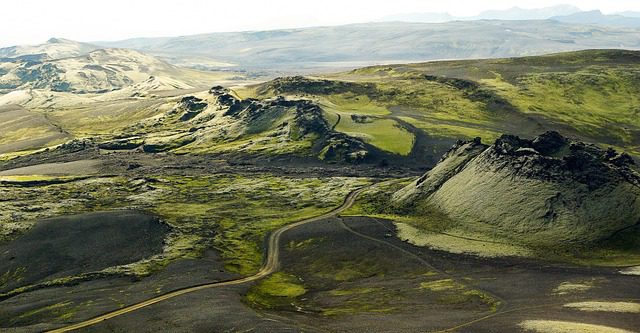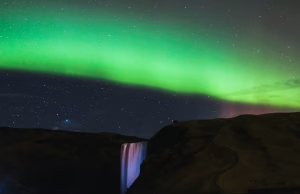Iceland’s otherworldly landscapes and unique culture make it a dream destination. But its delicate environment and distinctive customs require mindful tourism. To preserve Iceland’s natural wonders and avoid causing offense, it’s crucial to know what things not to do in Iceland.
This guide outlines 20 common mistakes to avoid in Iceland, from environmental no-nos to cultural faux pas.
- 1. Do Not Litter or Throw Trash on the Ground
- 2. Do Not Step on Fragile Moss or Lie Down in It for Photos
- 3. Do Not Make Jokes About Iceland and Greenland
- 4. Do Not Ignore Warning Signs or Local Advice
- 5. Do Not Drive Off-Road Without Permission
- 6. Do Not Carve Your Name Into Landscapes or Rocks
- 7. Do Not Buy Bottled Water Unnecessarily
- 8. Do Not Shop at Lundabúðir
- 9. Do Not Purchase Fake Wool Sweaters
- 10. Do Not Drink Tap Water From Hot Springs or Geothermal Areas
- 11. Do Not Visit South Coast Plain Wreck Without Proper Respect
- 12. Do Not Ignore Local Customs When Visiting Swimming Pools
- 13. Do Not Make Cairns (Stone Piles) Along Hiking Trails
- 14. Do Not Rip Out Moss to Insulate Tents
- 15. Do Not Walk on Ice Floes Unless Absolutely Safe
- 16. Do Not Hitchhike During Poor Visibility Weather
- 17. Do Not Drive Without Checking Road Conditions
- 18. Do Not Touch or Disturb Wildlife
- 19. Do Not Camp Outside Designated Areas Without Permission
- 20. Do Not Attempt Solo Glacier Hikes Unprepared
- Why Choose OneVasco?
- FAQs
1. Do Not Litter or Throw Trash on the Ground
Iceland takes great pride in its unspoiled landscapes. Littering is one of the biggest things that offend locals in Iceland. Always dispose of waste properly or carry it until you find a bin. Littering can result in hefty fines. Leave no trace to keep Iceland beautiful.
2. Do Not Step on Fragile Moss or Lie Down in It for Photos
Iceland’s iconic mossy landscapes may look inviting, but the moss is exceptionally delicate. A single footprint can take decades to recover. Avoid stepping on moss or lying in it for photos. Always stick to marked trails, as damaging moss is illegal.

Suggested Read:Iceland Visa Rejection for Indians
3. Do Not Make Jokes About Iceland and Greenland
While it may seem like harmless fun, making jokes about Iceland and Greenland is one of the things not to do in Iceland. Locals find it annoying. Respect their identities and focus on appreciating Iceland’s unique qualities.
4. Do Not Ignore Warning Signs or Local Advice
Iceland’s powerful natural forces demand respect. Ignoring warning signs or local advice is a grave mistake for first-timers in Iceland. Whether it’s a roped-off geothermal area or a closed hiking trail, these barriers are there for your safety. Always follow safety signs and listen to locals to stay safe.
5. Do Not Drive Off-Road Without Permission
Iceland’s delicate landscapes are highly vulnerable to damage from vehicles. Driving off-road without permission in Iceland is illegal and one of the things to avoid as a tourist. Stay on marked roads to protect the environment and avoid fines.
6. Do Not Carve Your Name Into Landscapes or Rocks
You may want to leave your mark, but carving your name into Iceland’s landscapes or rocks is a definite no-no. This act of vandalism scars the environment and is deeply disrespectful.
7. Do Not Buy Bottled Water Unnecessarily
Iceland boasts some of the cleanest, purest tap water in the world. Buying bottled water is an unnecessary thing for first-timers in Iceland. Bring a reusable bottle and fill up from the tap. You’ll save money and help reduce plastic waste.
8. Do Not Shop at Lundabúðir
While it’s good to support local businesses, shopping at Lundabúðir is one of the things not to do in Iceland’s malls. Locals view this chain as overpriced and catering to tourists. Seek out smaller, independent shops for authentic Icelandic goods and souvenirs.
Suggested Read:Iceland in February
9. Do Not Purchase Fake Wool Sweaters
Iceland’s iconic lopapeysa wool sweaters are a must-have souvenir. However, many stores sell mass-produced, low-quality imitations. Insist on genuine Icelandic wool from reputable sellers. The real deal is worth the investment.
10. Do Not Drink Tap Water From Hot Springs or Geothermal Areas
While Iceland’s tap water is generally safe, drinking from hot springs or geothermal areas is one of the things to avoid in Iceland as a tourist. This water can contain harmful bacteria and minerals. Stick to drinking from cold taps or bottles.

11. Do Not Visit South Coast Plain Wreck Without Proper Respect
The haunting remains of a US Navy plane on Iceland’s black sand beaches have become a popular attraction. However, visiting the US Navy plane wreck on Iceland’s South Coast should be done with respect as it is a solemn memorial, not a playground. Avoid climbing on the wreck and take photos from a distance.
12. Do Not Ignore Local Customs When Visiting Swimming Pools
Iceland’s swimming pools have strict hygiene rules. Always shower thoroughly before entering the pool, without a swimsuit. Follow all posted etiquette guidelines. Respecting these rules is crucial to avoid offending locals and maintain public health.
13. Do Not Make Cairns (Stone Piles) Along Hiking Trails
You may spot rock piles along Iceland’s trails, but making your own cairns must be avoided. It can mislead hikers and harm ecosystems. Stick to marked paths and leave nature undisturbed.
14. Do Not Rip Out Moss to Insulate Tents
Iceland’s plush moss may seem like ideal natural insulation, but ripping it out to pad tents is one of the most damaging things not to do in Iceland. This practice destroys the fragile plant and is illegal. Use proper camping gear instead.
Suggested Read:Is Iceland Safe to Visit?
15. Do Not Walk on Ice Floes Unless Absolutely Safe
Iceland’s glacial lagoons are filled with floating ice sculptures. But walking on ice floes is a risky thing for first-timers in Iceland. The ice can be unstable and the water deathly cold. Always admire Iceland’s ice floes from solid ground or with a guide and safety gear.
16. Do Not Hitchhike During Poor Visibility Weather
Iceland’s fickle weather can turn treacherous quickly. Severe storms, fog, and whiteouts can make roadside travel extremely dangerous. Wait out bad weather before seeking rides. Your safety should always come first.
17. Do Not Drive Without Checking Road Conditions
Iceland’s roads can be deceptively challenging, especially in winter. So, consult official road reports before setting out. Heed all closure notices and detour signs. Don’t let a scenic road trip turn into a reckless ordeal.
18. Do Not Touch or Disturb Wildlife
Iceland’s animals are a delight to observe, but it’s crucial to do so responsibly. Observe wildlife from a distance with binoculars or a zoom lens. Disturbing animals is illegal and stressful for them. Enjoy the moment quietly and respect their space.

19. Do Not Camp Outside Designated Areas Without Permission
Iceland welcomes campers, but has strict rules about where you can pitch a tent. Stick to official campsites or seek approval for private land camping. Unauthorized camping can result in fines and environmental damage.
20. Do Not Attempt Solo Glacier Hikes Unprepared
Iceland’s glaciers are as dangerous as they are beautiful. Attempting solo glacier hikes without proper experience, equipment, or guides is one of the riskiest things to avoid as a tourist in Iceland. Always follow a certified guide, as glaciers have hidden cracks and unstable surfaces.
Why Choose OneVasco?
OneVasco makes visa applications effortless. Our expert team manages the entire process, allowing you to focus on your journey.
Enjoy stress-free travel with fast visa approvals.
-
Expert and Personalized Support
-
Efficient and Hassle-Free Process
-
Real-Time Tracking and Updates
-
Transparent Communication
-
Trusted by Millions
FAQs
What are the laws in Iceland for tourists?
Iceland has strict laws for tourists, including bans on off-road driving, camping outside designated areas, and disturbing wildlife. Littering, vandalism, and public drunkenness are illegal. Violations result in fines or penalties.
Is it ok to wear shorts in Iceland?
While shorts are not offensive, what not to wear in Iceland is weather-dependent. Shorts are fine on warm days, but you’ll mostly need pants. Dress in layers for Iceland’s unpredictable climate, focusing on warmth and waterproofing.
Can unmarried couples go on holiday to Iceland?
Yes, unmarried couples can travel to Iceland without issues. Hotels have no problem with booking rooms, and public affection is accepted. Just respect local laws and customs.
Is it safe to visit Iceland as a solo traveler?
Yes, Iceland is very safe for solo travelers. Things for first-timers in Iceland to watch out for include unpredictable weather, challenging hikes, and ocean currents. Always inform someone of your plans and carry emergency supplies.
What is the best month to go to Iceland?
The best month to visit Iceland depends on your preferences. Summer (June-August) offers long days and warm weather. Winter (November-March) is perfect for the Northern Lights. Spring (April-May) and fall (September-October) provide mild weather and fewer crowds.
Can two male friends share a hotel room in Iceland?
Yes, two male friends can share a hotel room in Iceland. The country is LGBTQ+ friendly, and discrimination is illegal. You’ll be welcomed without issues.
What is not allowed in Iceland as a tourist?
Iceland has a number of strict prohibitions to protect its environment and culture. Things not to do in Iceland include littering, off-road driving, camping outside designated areas, and disturbing wildlife. Vandalism, public drunkenness, and nudity are also prohibited. Always respect local rules to avoid fines.
What are the strict rules in Iceland?
There are important things not to do in Iceland, such as off-road driving and littering. Camping is only allowed in designated areas. Public alcohol consumption is banned. Always shower before hot spring bathing, no swimsuit allowed. Don’t disturb wildlife, pick plants, or hunt without permits. Follow these rules to protect Iceland’s environment.





















